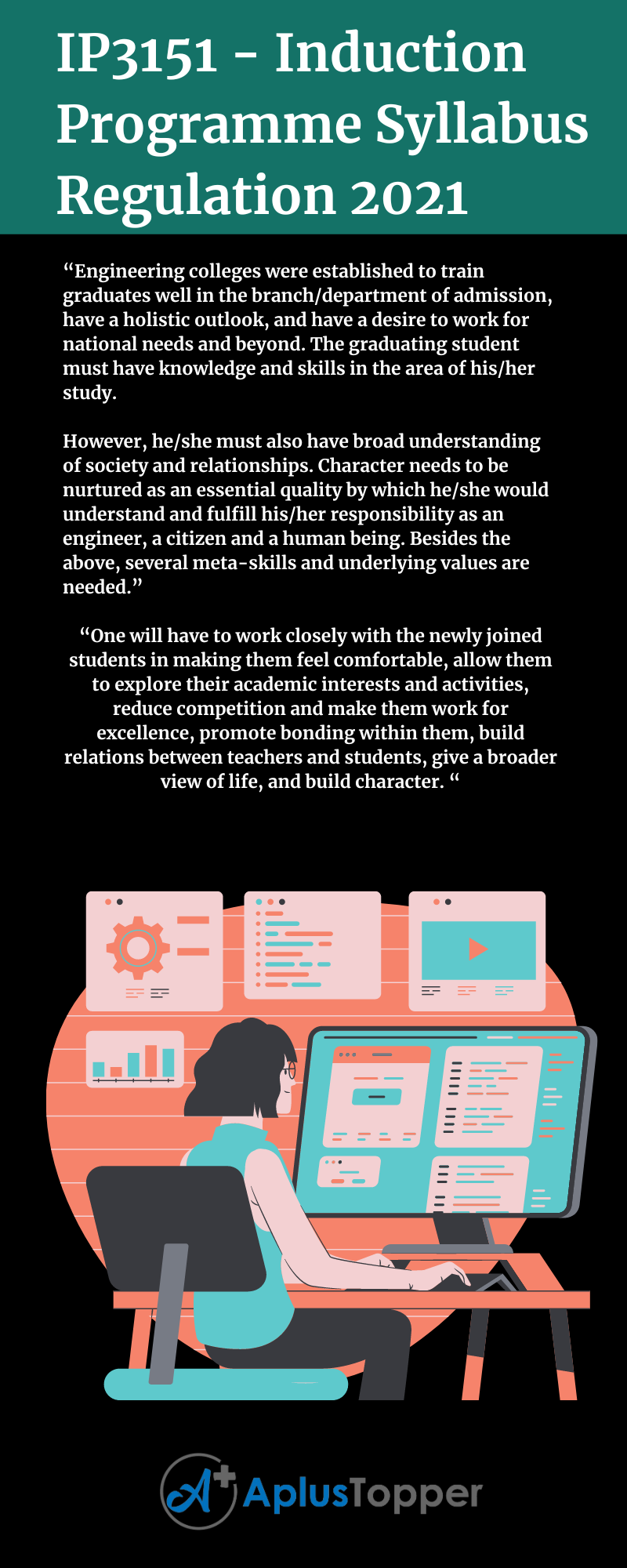The article contains the subject code IP3151, which deals with the Anna University B.E Electrical and Electronics Engineering Semester – I Induction Programme Syllabus. Unit wise detailed syllabus of this subject IP3151 is included in this article. You can get assistance for note preparation or can understand the chapters contain topics in one place.
Effective results need effective preparation and having the required knowledge of the topics included in the subject. If you want to perform well in academics proper guidance and the subject syllabus in mind are necessary, article IP3151 – Induction Programme Syllabus will fulfill the details regarding your preparation.
If you want to know more about the syllabus of B.E Electrical and Electronics Engineering connected to an affiliated institution’s four-year undergraduate degree program. We provide you with a detailed Year-wise, semester-wise, and Subject-wise syllabus in the following link B.E Electrical and Electronics Engineering Syllabus Anna University, Regulation 2021.
IP3151 – Induction Programme Syllabus
This is a mandatory 2 week programme to be conducted as soon as the students enter the institution. Normal classes start only after the induction program is over.
The induction programme has been introduced by AICTE with the following objective:
“Engineering colleges were established to train graduates well in the branch/department of admission, have a holistic outlook, and have a desire to work for national needs and beyond. The graduating student must have knowledge and skills in the area of his/her study. However, he/she must also have broad understanding of society and relationships. Character needs to be nurtured as an essential quality by which he/she would understand and fulfill his/her responsibility as an engineer, a citizen and a human being. Besides the above, several meta-skills and underlying values are needed.”
“One will have to work closely with the newly joined students in making them feel comfortable, allow them to explore their academic interests and activities, reduce competition and make them work for excellence, promote bonding within them, build relations between teachers and students, give a broader view of life, and build character. “
Hence, the purpose of this programme is to make the students feel comfortable in their new environment, open them up, set a healthy daily routine, create bonding in the batch as well as between faculty and students, develop awareness, sensitivity and understanding of the self, people around them, society at large, and nature.
The following are the activities under the induction program in which the student would be fully engaged throughout the day for the entire duration of the program.
(i) Physical Activity
This would involve a daily routine of physical activity with games and sports, yoga, gardening, etc.
(ii) Creative Arts
Every student would choose one skill related to the arts whether visual arts or performing arts. Examples are painting, sculpture, pottery, music, dance etc. The student would pursue it everyday for the duration of the program. These would allow for creative expression. It would develop a sense of aesthetics and also enhance creativity which would, hopefully, grow into engineering design later.
(iii) Universal Human Values
This is the anchoring activity of the Induction Programme. It gets the student to explore oneself and allows one to experience the joy of learning, stand up to peer pressure, take decisions with courage, be aware of relationships with colleagues and supporting stay in the hostel and department, be sensitive to others, etc. A module in Universal Human Values provides the base. Methodology of teaching this content is extremely important. It must not be through do’s and dont’s, but get students to explore and think by engaging them in a dialogue. It is best taught through group discussions and real life activities rather than lecturing.

Discussions would be conducted in small groups of about 20 students with a faculty mentor each. It would be effective that the faculty mentor assigned is also the faculty advisor for the student for the full duration of the UG programme.
(iv) Literary Activity
Literary activity would encompass reading, writing and possibly, debating, enacting a play etc.
(v) Proficiency Modules
This would address some lacunas that students might have, for example, English, computer familiarity etc.
(vi) Lectures by Eminent People
Motivational lectures by eminent people from all walks of life should be arranged to give the students exposure to people who are socially active or in public life.
(vii) Visits to Local Area
A couple of visits to the landmarks of the city, or a hospital or orphanage could be organized. This would familiarize them with the area as well as expose them to the underprivileged.
(viii) Familiarization to Dept./Branch & Innovations
They should be told about what getting into a branch or department means and what role it plays in society, through its technology. They should also be shown the laboratories, workshops & other facilities.
(ix) Department Specific Activities
About a week can be spent in introducing activities (games, quizzes, social interactions, small experiments, design thinking, etc.) that are relevant to the particular branch of Engineering/Technology/Architecture that can serve as a motivation and kindle interest in building things (become a maker) in that particular field. This can be conducted in the form of a workshop. For example, CSE and IT students may be introduced to activities that kindle computational thinking, and get them to build simple games. ECE students may be introduced to building simple circuits as an extension of their knowledge in Science, and so on. Students may be asked to build stuff using their knowledge of science.
The Induction Programme is totally an activity-based program and therefore there shall be no tests/assessments during this programme.
References:
Guide to Induction program from AICTE
Related Posts Of Semester – I:
- HS3152 – Professional English – I
- MA3151 – Matrices and Calculus
- PH3151 – Engineering Physics
- CY3151 – Engineering Chemistry
- GE3151 – Problem Solving and Python Programming
- GE3152 – Heritage of Tamils
